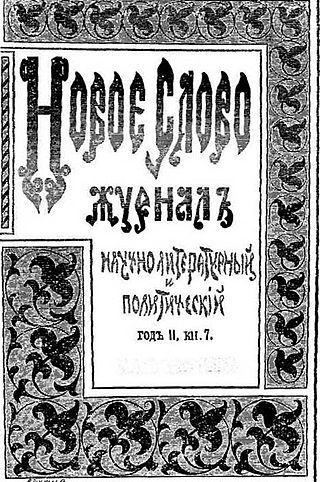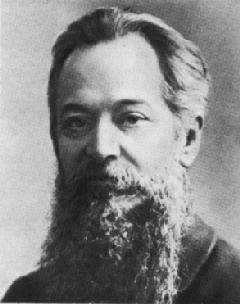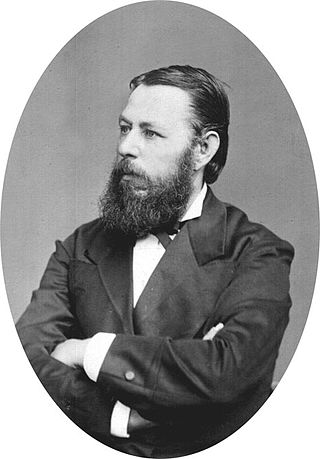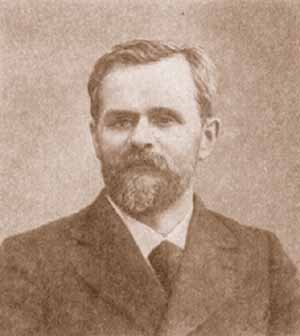Related Research Articles

PeterBerngardovich Struve was a Russian political economist, philosopher, historian and editor. He started his career as a Marxist, later became a liberal and after the Bolshevik Revolution joined the White movement. From 1920, he lived in exile in Paris, where he was a prominent critic of Russian Communism.

Yekaterina Dmitriyevna Kuskova was a Russian Empire economist, journalist and politician involved in founding both the Russian Social-Democratic Workers' Party (RSDRP) and the liberal Constitutional Democratic Party. She was an advocate of social reformism and opposed the Bolsheviks.

Sergei Nikolayevich Bulgakov was a Russian Orthodox theologian, priest, philosopher, and economist. Orthodox writer and scholar David Bentley Hart has said that Bulgakov was "the greatest systematic theologian of the twentieth century." Father Sergei Bulgakov also served as a spiritual father and confessor to Mother Maria Skobtsova.
Nachalo was a Russian Marxist monthly magazine published in Saint Petersburg, Russia, in 1899.

Novoye Slovo was the title of two separate Russian magazines published in Saint Petersburg, the first appearing between 1893 or 1895, and 1897 and the second in the fall of 1917.
Zhizn was a Russian magazine published first in Saint Petersburg (1897-1901), then in London and Geneva (1902).

Pyotr Nikitich Tkachev was a Russian writer, critic and revolutionary theorist who formulated many of the revolutionary principles that were later developed and put into action by Vladimir Lenin. Although Tkachev is sometimes described as "the First Bolshevik", he did not figure prominently in the mythology of the Soviet Union.

Mikhail Tugan-Baranovsky was a Ukrainian economist, politician, statesman. He is remembered as one of the founders of the National Academy of Sciences of Ukraine and one of the earliest Ukrainian ministers of finances in the Vynnychenko's General Secretariat of the Central Council of Ukraine. In professional circles he is remembered as a leading exponent of Legal Marxism in the Tsarist Russian Empire and was the author of numerous works dealing with the theory of value, the distribution of a social revenue, history of managerial development, and fundamentals of cooperative managerial activities.
Marxism is a method of socioeconomic analysis that originates in the works of 19th century German philosophers Karl Marx and Friedrich Engels. Marxism analyzes and critiques the development of class society and especially of capitalism as well as the role of class struggles in systemic, economic, social and political change. It frames capitalism through a paradigm of exploitation and analyzes class relations and social conflict using a materialist interpretation of historical development – materialist in the sense that the politics and ideas of an epoch are determined by the way in which material production is carried on.

Nikolai Frantsevich Danielson was a Russian socio-political figure, economist, publicist, and one of the theoreticians of liberal populism. He is also famous for his translations of Das Kapital by Marx, and being a writer on Russian economic development.

Nikolay Sergeyevich Rusanov, also known under the pseudonyms of K. Tarasov and N. Kudrin, was a Russian revolutionary who connected the revolutionary populist movement of the 1870s with the revolutionary parties of the early twentieth century, particularly the Russian Socialist-Revolutionary Party (PSR).

Nikolai Feodorovich Annensky was a Russian economist, statistician and politician. He was a member of the populist (narodnik) movement and the Socialist-Revolutionary Party before becoming one of the founders of the Russian Popular Socialist Party (NSP) in 1906.

Sergei Nikolaevich Prokopovich was a Russian economist, sociologist, Revisionist Social-Democrat and liberal politician.

Vasilii Pavlovich Vorontsov was an influential Russian narodnik economist and sociologist, one of the principal protagonists in the controversy between narodnik and Marxist economists in the 1880s and 1890s.

Nikolai Vladislavovich Valentinov was a Russian philosopher, journalist and economist. A member of the Russian Social Democratic Workers' Party (RSDRP), he was an exponent of empirio-criticism. He was also known as Nikolai Valentinov-Volski and, later, as E. Yurevski.

Georgi Valentinovich Plekhanov was a Russian revolutionary, philosopher and Marxist theoretician. He was a founder of the social-democratic movement in Russia and was one of the first Russians to identify himself as "Marxist". Facing political persecution, Plekhanov emigrated to Switzerland in 1880, where he continued in his political activity attempting to overthrow the Tsarist regime in Russia. Plekhanov is known as the "father of Russian Marxism".

Mir Bozhiy was a Russian monthly magazine published in Saint Petersburg in 1892–1906. It was edited first by Viktor Ostrogorsky (1892-1901), then by Fyodor Batyushkov (1902-1906). In July 1906 Mir Bozhiy was closed by censors. The publisher of the magazine was Alexandra Davydova, mother-in-law of Alexander Kuprin.
Orthodox Marxism is the body of Marxist thought which emerged after the death of Karl Marx and Friedrich Engels in the late 19th century, expressed in its primary form by Karl Kautsky. Kautsky's views of Marxism dominated the European Marxist movement for two decades, and orthodox Marxism was the official philosophy of the majority of the socialist movement as represented in the Second International until the First World War in 1914, which caused Kautsky's influence to wane and brought to prominence the alternative orthodoxy of Vladimir Lenin. Orthodox Marxism aimed to simplify, codify and systematize Marxist method and theory by clarifying perceived ambiguities and contradictions in classical Marxism.

Rabochaya Mysl was a Russian social-democrat newspaper and bearer of the Economist current.
Vekhovstvo (vekhovtsy) was a philosophical and socio–political trend in the Russian intellectual environment at the beginning of the 20th century, which got its name from the program collection Vekhi (1909). The initiator of the publication of the latter was Mikhail Gershenzon.
References
- Vincent Barnett, 'Tugan-Baranovsky as a Pioneer of Trade Cycle Analysis', Journal of the History of Economic Thought, December 2001.
- Neil Harding. "Legal Marxism" in The Dictionary of Marxist Thought, ed. Tom Bottomore, London, Blackwell Publishing Ltd, 1983, 2nd revised edition 1991, ISBN 0-631-18082-6 pp. 307–308.
- Richard Kindersley. The First Russian Revisionists: A Study of Legal Marxism in Russia, Oxford University Press, 1962, 260p.
- Richard Pipes. Struve: Liberal on the Left, 1870-1905, Harvard University Press, 1970, xiii, 415p. ISBN 0-674-84595-1
- Arthur P. Mendel. Dilemmas of Progress in Tsarist Russia: Legal Marxism and Legal Populism, Harvard University Press, 1961, 310p.
- Andrzej Walicki. The Controversy over Capitalism: Studies in the Social Philosophy of Russian Populists, Oxford University Press, 1969, 206p. Paperback reprint: University of Notre Dame Press, 1989, ISBN 0-268-00770-5, 197p.